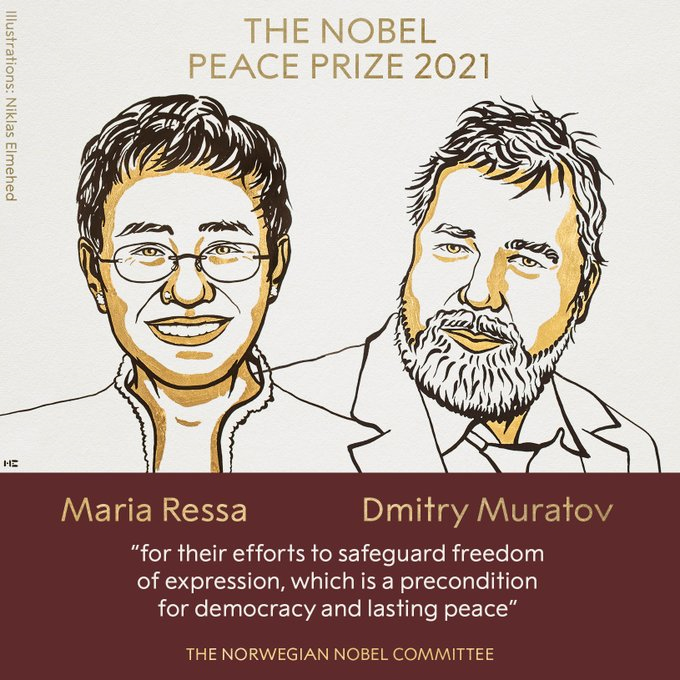Nobel Peace Prize 2021: Two journalists standing for democracy and freedom of the press
In October, the two journalists Maria Ressa from the Philippines and Dmitry Muratov from Russia were awarded the Nobel Peace Prize. Recognising “their courageous fight for freedom of expression”, Berit Reiss-Andersen, Chair of the Norwegian Nobel Committee, added that they are also representative of all journalists who stand up for this ideal in a world in which democracy and freedom of the press are facing increasingly adverse conditions. This year’s prize is the first to be awarded to a journalist since the German Karl von Osiecki, who received the Nobel Peace Prize in 1935 for revealing his country’s secret post-war rearmament program. The prize – a gold medal, a certificate and a cash prize of 10 million Swedish kronor (around €1 million) – will be awarded on December 10 in Oslo in person if public health conditions allow. December 10 marks the anniversary of the death of Swedish industrialist Alfred Nobel, who founded the Nobel Prizes in his will in 1895. Muratov, 59, one of the founders and director of the Russian newspaper Novaya Gazeta, “has been defending freedom of expression in Russia for decades in increasingly difficult conditions,” the commission noted.
Maria Ressa uses freedom of expression to expose abuses of power, the use of violence and growing authoritarianism in her native country, the Philippines. In 2012, she co-founded Rappler, a digital media company for investigative journalism, which she still heads. As a journalist and CEO at Rappler, Ressa has shown herself to be a fearless defender of freedom of expression. Rappler has focused critical attention on the Duterte regime’s controversial, murderous anti-drug campaign. The number of deaths is so high that the campaign resembles a war waged against the country’s own population. Ms Ressa and Rappler have also documented how social media is being used to spread fake news, harass opponents and manipulate public discourse.
Dmitry Muratov has defended freedom of speech in Russia under increasingly challenging conditions for decades. In 1993, he was one of the founders of the independent newspaper Novaya Gazeta. He has been the newspaper’s editor-in-chief for a total of 24 years, starting in the position in 1995. Novaya Gazeta is considered the most independent newspaper in Russia today, with a fundamentally critical attitude towards power. The newspaper’s fact-based journalism and professional integrity have made it an important source of information on censurable aspects of Russian society rarely mentioned by other media. Since its start-up in 1993, Novaya Gazeta has published critical articles on subjects ranging from corruption, police violence, unlawful arrests, electoral fraud and ‘troll factories’ to the use of Russian military forces both within and outside Russia.


